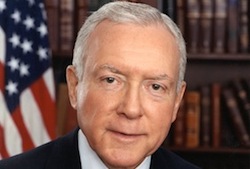Senate Finance Committee Chairman Max Baucus (D-Mont.) and Ranking Member Orrin Hatch (R-Utah) have launched a process for the committee to begin developing a proposal to reform America’s tax code. Over the next several months, the committee will convene weekly to discuss a series of topics and collect feedback from members on a wide range of options for taking on tax reform. The revised incentives are designed to be more technology neutral.
 “It is time to bring our energy tax policy into the 21st century,” Baucus said. “Our current set of energy tax incentives is overly complex and picks winners and losers with no clear policy rationale. We need a system of energy incentives that is more predictable, rational, and technology-neutral to increase our energy security and ensure a clean and healthy environment for future generations.”
“It is time to bring our energy tax policy into the 21st century,” Baucus said. “Our current set of energy tax incentives is overly complex and picks winners and losers with no clear policy rationale. We need a system of energy incentives that is more predictable, rational, and technology-neutral to increase our energy security and ensure a clean and healthy environment for future generations.”
Ethanol Today reports that information released by Baucus finds that current law contains 42 different energy tax incentives, including more than a dozen for fossil fuels. An additional 10 tax incentives exist for renewable fuels and alternative vehicles, along with six credits for clean electricity. Of these, 25 are set to expire every year to two years and if they are extended, could cost taxpayers nearly $150 billion over the next decade.
The proposal aims to neutralize clean energy technologies, i.e. not play “favorites” as the federal government is often accused of doing. Based on several criteria, tax incentives for all forms of energy would be based on a “cleanliness credit” or determined by a ratio of the greenhouse gas emissions (GHGs) of a facility divided by its electricity production.
The incentive would be available as either a production tax credit of up to 2.3 cents per kilowatt hour or an investment tax credit of up to 20 percent. The production tax credit would be indexed for inflation and could be claimed on a single facility for a maximum of 10 years.
 A second incentive outline by the proposal is the clean transportation incentive and would be available for fuels that are 25 percent cleaner than conventional gasoline. The percent of “cleanliness” would be determined by the production process’s lifecycle emissions basis as determined by the Environmental Protection Agency (EPA). The max credit would be $1 per gallon.
A second incentive outline by the proposal is the clean transportation incentive and would be available for fuels that are 25 percent cleaner than conventional gasoline. The percent of “cleanliness” would be determined by the production process’s lifecycle emissions basis as determined by the Environmental Protection Agency (EPA). The max credit would be $1 per gallon.
Senator Baucus has invited members of Congress, key stakeholders and the general public to provide feedback on the draft. Comments must be submitted by January 31, 2014 (the same time comments for the EPA’s proposed renewable fuel volumes for the 2014 Renewable Fuel Standard (RFS). Click here for information about the proposal as well as information on how to submit comments.

